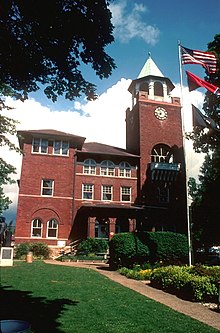Rhea County, Tennessee
| Rhea County, Tennessee | |
|---|---|

The Rhea County Courthouse, site of the Scopes Trial
|
|
|
Location in the U.S. state of Tennessee |
|
 Tennessee's location in the U.S. |
|
| Founded | 1807 |
| Named for | John Rhea |
| Seat | Dayton |
| Largest city | Dayton |
| Area | |
| • Total | 336 sq mi (870 km2) |
| • Land | 315 sq mi (816 km2) |
| • Water | 21 sq mi (54 km2), 6.3% |
| Population | |
| • (2010) | 31,809 |
| • Density | 101/sq mi (39/km²) |
| Congressional district | 4th |
| Time zone | Eastern: UTC-5/-4 |
| Website | www |
Rhea County (pronounced "ray") is a county located in the U.S. state of Tennessee. As of the 2010 census, the population was 31,809. Its county seat is Dayton.
Rhea County comprises the Dayton, TN Micropolitan Statistical Area, which is also included in the Chattanooga-Cleveland-Dalton, TN-GA-AL Combined Statistical Area.
Rhea County is named for Tennessee politician and Revolutionary War veteran John Rhea.
A portion of the Trail of Tears ran through the county as part of the United States government's removal of the Cherokee in the 1830s.
During the American Civil War, Rhea County was one of the few counties in East Tennessee that was heavily sympathetic to the cause of the Confederate States of America. It was the only East Tennessee county that did not send a delegate to the pro-Union East Tennessee Convention in 1861. The county voted in favor of Tennessee's June 1861 Ordinance of Secession, 360 votes to 202. Rhea raised seven companies for the Confederate Army, compared to just one company for the Union.
Rhea had the only female cavalry company on either side during the Civil War. It was made up of young women in their teens and twenties from Rhea County and was formed in 1862. The girls named their unit the Rhea County Spartans. Until 1863, the Spartans simply visited loved ones in the military and delivered the equivalent of modern-day care packages. After Union troops entered Rhea in 1863, the Spartans may have engaged in some spying for Confederate forces. The members of the Spartans were arrested in April 1865 under orders of a Rhea County Unionist and were forced to march to the Tennessee River. From there they were transported to Chattanooga aboard the USS Chattanooga. Once in Chattanooga, Union officers realized the women were not a threat and ordered them released and returned to Rhea County. They first were required to take the oath of allegiance to the United States government. The Spartans were not an officially recognized unit of the Confederate Army.
...
Wikipedia
